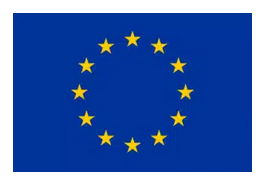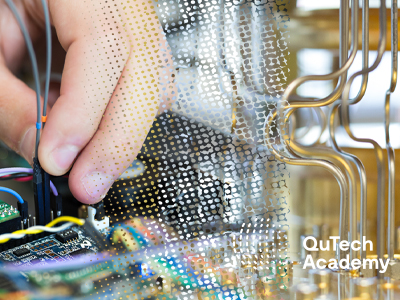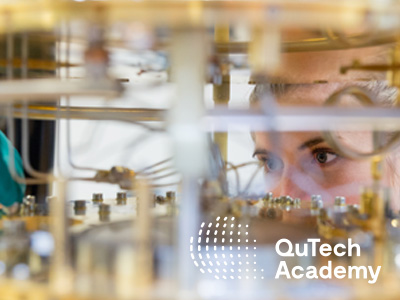Overview
Unravel the physics behind Germanium qubits, their fabrication process, control, and applications. Learn how to apply machine learning for auto-tuning, and how to perform quantum error correction and quantum algorithms.
In the race towards a fault-tolerant quantum computer, the semiconducting qubit platform is the only one that has, thus far, been shown to be scalable. Germanium qubits are a new type of semiconducting qubits, and their progress has been exceptionally fast since the development of the material in 2018.
You will learn about the physics behind Germanium qubits, their advantages, and challenges compared to other qubit platforms, and the electrical components that are needed to control them. In addition, you will familiarize yourself with different companies from the semiconducting industry, the fabrication facilities, and the latest developments in the field.
This course is a collaboration between several parties, all of whom have state-of-the-art facilities for fabrication, control, or applications using Germanium qubits. By taking this course you will have the opportunity to learn about Germanium qubits from professionals in the field who are conducting innovative research that is not being done elsewhere.
The course is a journey of discovery, so we encourage you to bring your own experiences, insights, and thoughts via the forum!
This course is authored by experts from the QuTech research center at Delft University of Technology. In the center, scientists and engineers work together to drive research and development in quantum technology. QuTech Academy's aim is to inspire, share and disseminate knowledge about the latest developments in quantum technology.
What You'll Learn
- Understand the physics behind Germanium qubits and their advantages and challenges.
- Learn how Germanium qubits can be controlled and how this process can be automatized using machine learning.
- Familiarize yourself with different companies in the semiconducting industry and their facilities.
- Identify how quantum algorithms and quantum error correction can be performed using Germanium qubits.
This course was supported by IGNITE:


This course was supported by IGNITE – Integrated Germanium Quantum Technology. This project has received funding from the European Union's Horizon Europe Programme under grant agreement no.101069515.
Details
Course Syllabus
WEEK 1: Semiconductor devices and materials
- Semiconductor devices - industrial approach
- What can CMOS technology do for quantum computing?
- Semiconductor devices and their scaling using the industrial approach
- Semiconductor foundry facilities: the good and the bad for qubits
- IMEC's latest qubit developments
- Summary and outlook
- Semiconductor materials - structure and growth
- Semiconductors for spin qubits
- Germanium quantum wells on silicon
- Germanium quantum wells on silicon-germanium
- Growth methods
- Characterization techniques
WEEK 2: Germanium qubits
- Quantum dot qubits and Germanium physics
- Germanium qubits - single spin and scaling
- Germanium qubits - multi-spin encodings
- Physics of holes
- Hole spin qubits
- Mid-term exam (multiple choice)
WEEK 3: Tuning quantum dots
- Electronics for quantum computing
- Introduction to electronics for quantum computing
- Room temperature electronics
- Cryogenic qubit chip carriers
- Contribution to IGNITE
- Quantum dots auto-tuning - experimental
- Auto-tuning a quantum computer
- Tuning and operation of arrays
- Finding operation points example
- Quantum dots auto-tuning - theory
- What is auto-tuning?
- Neural network tuning
- Navigating charge stability diagrams
- Experimental implementation
- Towards universal quantum algorithms
WEEK 4: Quantum error correction and quantum algorithms
- Quantum error correction
- Classical error correction
- Quantum error correction
- Progress and challenges
- Quantum algorithms
- Introduction to quantum algorithms
- The first algorithms
- Quantum annealing
- Quantum machine learning
WEEK 5:
- Final exam (multiple choice)
Other instructors
- Søren Andresen - senior product manager at Quantum Machines
- Pablo Bermejo - senior scientist at Multiverse Computing
- Anasua Chatterjee - assistant professor at the Niels Bohr Institute, University of Copenhagen
- Daniel Chrastina - member of the SiGe epitaxy group of the physics department of the Politecnico di Milano in Italy
- Georgios Katsaros - principal investigator of the Nanoelectronics group at IST Austria
- Ruoyu Li - senior researcher at IMEC, specializing in quantum computing with semiconductor spin qubits
- Andras Palyi - associate professor at the Budapest University of Technology and Economics
Qualifications
Chartered Engineering Competences
All our online courses and programs have been matched to the competences determined by KIVI’s Competence Structure, a common frame of reference for everyone, across all disciplines, levels and roles.
These competences apply to this course:
- A1: Extend your theoretical knowledge of new and advancing technologies.
Admission
This is a Massive Open Online Course (MOOC) that runs on edX.
Prerequisites:
Courses on Edx.org:
- Fundamentals of Quantum Information
- The Hardware of a Quantum Computer
- Quantum Error Correction and Quantum Algorithms
A prior knowledge of different fabrication methods.


